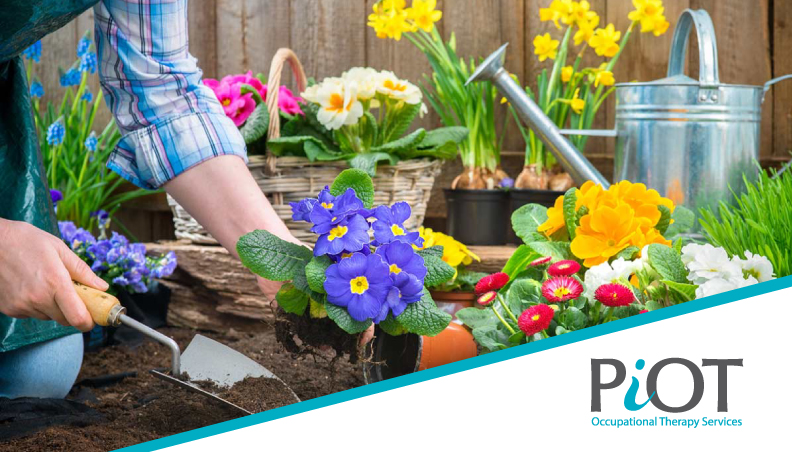
19 May Sunshine, Fresh Air and Green Care Therapy
Now that the long awaited summer weather is approaching, therapeutic gardening, or “Green Care” is an easy way to add a new dimension to your therapy routine.
In an article in the National Library of Medicine, (Gardening for Health: a regular dose of gardening, https://www.ncbi.nlm.nih.gov/pmc/articles/PMC6334070/) the author explains how gardening has been shown to have a wide range of mental and physical healthcare benefits.
“Why does gardening seem to be so beneficial to health? It combines physical activity with social interaction and exposure to nature and sunlight. Sunlight lowers blood pressure as well as increasing vitamin D levels in the summer, and the fruit and vegetables that are produced have a positive impact on the diet. Working in the garden restores dexterity and strength, and the aerobic exercise that is involved can easily use the same number of calories as might be expended in a gym. Digging, raking and mowing are particularly calorie intense; there is a gym outside many a window. The social interaction provided by communal and therapeutic garden projects for those with learning disabilities and poor mental health can counteract social isolation. Furthermore, it has also been reported that the social benefits of such projects can delay the symptoms of dementia (an effect that might be partly due to the beneficial effects of exercise). Patients who are recovering from myocardial infarction or stroke find that exercise in a garden, using constraint therapy of a paretic limb, for example, is more effective, enjoyable and sustainable than therapy in formal exercise settings. For some patients, gardening can even lead to employment. There are also successful schemes that involve volunteers to help older people who cannot manage their gardens, with both the volunteer and the owner benefitting from the social interaction and from the produce and a shared interest.”
Set up your garden to best accommodate your particular abilities. For those of you with limited mobility or who are wheelchair bound, a raised garden bed can be the perfect alternative to gardening in beds at ground level. This will allow you to tend to your plants with minimal bending at waist level and put things at easy reach so you can manage from a seated position. Alternatively, you can have a container garden, where you plant in pots, placing them on a convenient table height, adjusted to your requirements.
Elements of your usual therapy routine can be adapted to gardening. Hanging baskets of plants can be placed at varying heights from posts, fences or trees to encourage reaching and stretching of the arms. Raking the soil in long flower boxes will encourage back and forth motion, gently exercising arm and shoulder motion. To exercise different muscles in your hands to improve dexterity and fine motor skills, include some fast growing flowers such as marigolds and petunias, which require deadheading to promote flowering, which will oblige you to practise a pinch grip motion.
Lightweight ergonomic hand tools such as shovels, rakes, trowels, etc. are available with padded handles for a more comfortable grip. Some have longer or extendable handles to assist in reaching, and reducing fatigue and strain. If your hands are sensitive, wearing gardening gloves may help.
Choose an assortment of plants including vegetables that you will enjoy eating and flowers in your favourite colours. Some of these grow very quickly, and under the right conditions you will be able to see daily progress. This will give you purpose to continue your gardening activities as you will look forward to seeing the results of your continued efforts. Enjoy the fresh air, stretch and inhale deeply. Enjoy the sunshine, and see the birds and butterflies that your garden attracts.

